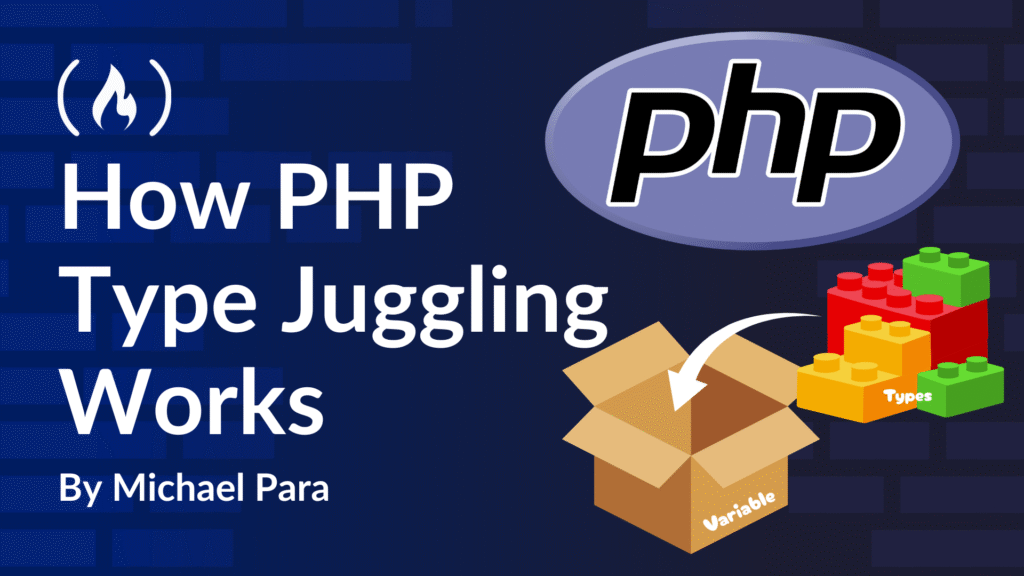PHP is a dynamically typed language. This means that variable types are determined at runtime, and you don’t need to explicitly define types when declaring variables.
One of PHP’s unique features is type juggling, a concept that can be both fascinating and tricky.
Type juggling happens when PHP automatically converts a variable from one data type to another, depending on how it is being used. While it may save you some effort, it can also lead to unexpected behaviour if you are not careful.
In this article, I will explain what PHP type juggling is, and how it works. In the following sections, you will learn how PHP handles type juggling and see examples to make the concept easier to understand.
What is PHP Type Juggling?
Type juggling refers to PHP’s ability to perform implicit type conversions. Instead of requiring you to declare a variable’s type, PHP evaluates the context in which the variable is used and changes its type accordingly. This is a direct result of PHP being dynamically typed.
For instance, if you use a string in a mathematical operation, PHP will try to convert that string into a number. Let’s take a look at a quick example:
$number = <span class="hljs-string">"10"</span>; <span class="hljs-comment">// This is a string</span>
$result = $number + <span class="hljs-number">5</span>; <span class="hljs-comment">// PHP converts $number to an integer</span>
<span class="hljs-keyword">echo</span> $result; <span class="hljs-comment">// Outputs: 15</span>
Here, $number starts as a string but is treated as an integer during the addition operation. This automatic conversion is what makes PHP type juggling so powerful and, at times, unpredictable.
How Does PHP Handle Type Juggling?
PHP evaluates types based on the context of the operation. When juggling types, it follows specific rules for conversions:
Strings to Numbers
If a string contains a valid numeric value, PHP converts it to a number when needed. For example:
<span class="hljs-keyword">echo</span> <span class="hljs-string">"5"</span> + <span class="hljs-number">10</span>; <span class="hljs-comment">// Outputs: 15</span>
PHP sees the string “5”. It understands it’s a number, and changes it to the number 5 before adding it.
Booleans in Numeric Contexts
In a boolean data type, the true value is treated as 1, and false is treated as 0. This can lead to unexpected results if you are not paying attention:
<span class="hljs-keyword">echo</span> <span class="hljs-literal">true</span> + <span class="hljs-number">10</span>; <span class="hljs-comment">// Outputs: 11</span>
<span class="hljs-keyword">echo</span> <span class="hljs-literal">false</span> + <span class="hljs-number">10</span>; <span class="hljs-comment">// Outputs: 10</span>
This is especially dangerous in comparisons:
var_dump(<span class="hljs-literal">false</span> == <span class="hljs-string">""</span>); <span class="hljs-comment">// true</span>
var_dump(<span class="hljs-literal">true</span> == <span class="hljs-string">"1"</span>); <span class="hljs-comment">// true</span>
var_dump(<span class="hljs-literal">false</span> == <span class="hljs-string">"0"</span>); <span class="hljs-comment">// true</span>
PHP tries to convert both operands to the same type before comparison, which can lead to unexpected results. For example, false == "" is true because both are loosely interpreted as falsy values.
Arrays and Type Conversion
Arrays cannot be directly converted into strings. If you attempt to do that, PHP will throw an error or a notice depending on the context.
Here is an example:
$array = [<span class="hljs-number">1</span>, <span class="hljs-number">2</span>, <span class="hljs-number">3</span>];
<span class="hljs-keyword">echo</span> $array + <span class="hljs-number">5</span>;
<span class="hljs-keyword">echo</span> $array . <span class="hljs-string">"test"</span>;
Here is the output with a fatal error:
Fatal error: Uncaught TypeError: Unsupported operand types: array + int <span class="hljs-keyword">in</span> /var/www/test.php:3
Stack trace:
<span class="hljs-comment">#0 {main}</span>
thrown <span class="hljs-keyword">in</span> /var/www/test.php on line 3
This because it is trying to use arrays in arithmetic or string operations, which doesn’t work like it does with other types. Instead, you need to explicitly convert them using functions like count() or implode(), depending on what you’re trying to achieve:
$array = [<span class="hljs-number">1</span>, <span class="hljs-number">2</span>, <span class="hljs-number">3</span>];
<span class="hljs-keyword">echo</span> count($array) + <span class="hljs-number">5</span>; <span class="hljs-comment">// Outputs: 8</span>
In the following section, we will explore some examples associated with type juggling to help you avoid potential bugs in your code.
Type Juggling Examples
Loose Comparisons (==)
PHP’s loose comparison operator (==) uses type juggling to compare values. This can lead to results that might not align with your expectations:
var_dump(<span class="hljs-number">0</span> == <span class="hljs-string">"0"</span>); <span class="hljs-comment">// true</span>
var_dump(<span class="hljs-number">0</span> == <span class="hljs-string">""</span>); <span class="hljs-comment">// true</span>
var_dump(<span class="hljs-string">"123abc"</span> == <span class="hljs-number">123</span>); <span class="hljs-comment">// true</span>
In this example, PHP converts "123abc" to the number 123 because of the loose comparison, even though "abc" is not numeric.
Strict Comparisons (===) as a Solution
To avoid the problems caused by loose comparisons, use strict comparisons (===). These compare both value and type:
var_dump(<span class="hljs-number">0</span> === <span class="hljs-string">"0"</span>); <span class="hljs-comment">// false</span>
var_dump(<span class="hljs-number">123</span> === <span class="hljs-string">"123"</span>); <span class="hljs-comment">// false</span>
Strict comparisons ensure that the types are not juggled, reducing the risk of unexpected behavior.
So the question is, how can you handle type juggling safely? This is what you’ll learn in the following section.
How to Handle Type Juggling Safely
Use Explicit Type Casting
If you want a variable to be a certain type (like an integer or a float), convert it directly instead of letting PHP guess. This avoids unexpected behavior.
$input = <span class="hljs-string">"42cats"</span>;
$cleanNumber = (<span class="hljs-keyword">int</span>)$input;
<span class="hljs-keyword">echo</span> $cleanNumber + <span class="hljs-number">10</span>; <span class="hljs-comment">// Outputs: 52</span>
PHP turns “42cats” into 42. PHP would do this even without casting, but casting shows clearly what you want and keeps behavior consistent.
Note: Any non-empty string (except “0”) becomes true when cast to a boolean.
Validate Input Before Use
Always check that input data is the type you expect, especially if it comes from users or outside sources.
$price = $_POST[<span class="hljs-string">'price'</span>] ?? <span class="hljs-string">''</span>;
<span class="hljs-keyword">if</span> (is_numeric($price)) {
<span class="hljs-keyword">echo</span> $price + <span class="hljs-number">10</span>;
} <span class="hljs-keyword">else</span> {
<span class="hljs-keyword">echo</span> <span class="hljs-string">"Please enter a valid number."</span>;
}
A string like "abc" would turn into 0 without this check, and you’d get 10—which is wrong and misleading.
Here, you have to check if the input is an array:
$data = $_POST[<span class="hljs-string">'items'</span>] ?? [];
<span class="hljs-keyword">if</span> (is_array($data)) {
<span class="hljs-keyword">echo</span> count($data);
} <span class="hljs-keyword">else</span> {
<span class="hljs-keyword">echo</span> <span class="hljs-string">"Invalid data format."</span>;
}
This prevents errors when PHP tries to use a string or number as an array.
Prefer Strict Comparisons (===)
Loose comparisons (==) let PHP convert types when comparing values. This can cause mistakes.
var_dump(<span class="hljs-number">0</span> == <span class="hljs-string">"0"</span>); <span class="hljs-comment">// true</span>
var_dump(<span class="hljs-number">0</span> == <span class="hljs-string">""</span>); <span class="hljs-comment">// false (not expected)</span>
var_dump(<span class="hljs-string">"abc"</span> == <span class="hljs-number">0</span>); <span class="hljs-comment">// false</span>
PHP turns both sides into numbers, so "abc" becomes 0. That’s usually not what you want.
To solve that issue, use strict comparisons (===) to check both the value and the type:
var_dump(<span class="hljs-number">0</span> === <span class="hljs-string">"0"</span>); <span class="hljs-comment">// false</span>
var_dump(<span class="hljs-string">"123"</span> === <span class="hljs-number">123</span>); <span class="hljs-comment">// false</span>
Wrapping Up
PHP type juggling is a double-edged sword. On one hand, it allows for flexibility and faster coding, but on the other, it can lead to subtle bugs if you are not cautious.
By understanding how type juggling works and following best practices like strict comparisons, explicit casting, and input validation, you can make your code safer and more predictable.
Stay tuned for my next article. You can explore more helpful PHP tutorials on my blog, FlatCoding. You can also check the PHP manual for more details. Thank you for reading.
Source: freeCodeCamp Programming Tutorials: Python, JavaScript, Git & MoreÂ


